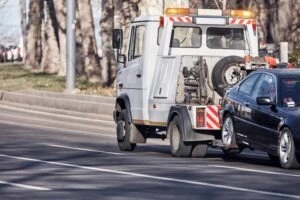
The length of time the police can hold your vehicle for investigation depends on the crime you’re alleged to have committed. Typically, the police in California can hold a vehicle under investigation for 30 days. However, these times can be extended if it can be justified to hold it for longer.
We’ll explore the rules surrounding police holds on vehicles in California, your rights as a vehicle owner, and what steps you can take to protect your interests, like contacting a Los Angeles criminal defense lawyer.
What Is a Police Hold on a Vehicle?
A police hold on a vehicle occurs when law enforcement seizes a car as part of an ongoing investigation. This hold is done under California impound and towing laws. A police hold can happen for various reasons, such as:
- The vehicle was used in the commission of a crime
- The vehicle contains evidence related to a crime
- The vehicle itself is evidence in a criminal case
During this time, the police have the right to keep the vehicle in their possession while they gather evidence to complete their investigation. As mentioned above, California law lets the police hold vehicles for 30 days and sometimes much longer.
There can be other reasons the police may tow your vehicle and hold it that aren’t related directly to a crime. These include:
- If you abandon your vehicle for a long time, it may get impounded to clear the road or lot.
- If you have unpaid fines or fees, they may impound your vehicle as a way to collect the debt.
- If the car is unsafe to operate.
For a free legal consultation, call (310) 896-2723
What Factors Affect the Duration of a Police Hold?
Several factors can influence how long the police may keep your vehicle:
- The severity of the crime being investigated
- The complexity of the case
- The amount of evidence that needs to be processed
- Whether the police can get a warrant to extend the hold
- Whether the vehicle itself is considered evidence
- The progress of the overall investigation
A criminal defense lawyer can explain which of these factors could be affecting why it’s taking so long to get your vehicle back. They can also help you contest the hold and possibly get your vehicle back sooner. Here are some steps you can take.
- Request a hearing: You can ask for a hearing to contest the hold. Normally, there is a short deadline after you receive notice that your car has been impounded.
- Provide evidence: Present any evidence that supports your claim that the vehicle should be released.
- Demonstrate hardship: If the hold is causing significant hardship, such as preventing you from getting to work, you can argue for the vehicle’s release on these grounds.
An experienced attorney can help you through the hearing process, but you must act quickly before your window to request a hearing closes.
What Are Your Rights During a Vehicle Hold?
It’s crucial to understand your rights when your vehicle is under a police hold:
- You have the right to be informed about the reason for the hold
- You have the right to contest the hold
- You have the right to retrieve personal belongings from the vehicle (with police supervision)
- You have the right to legal representation throughout the process
It’s best to have legal representation because using some of these rights can be challenging without legal advice. There can be a lot of bureaucracy involved to prevent alleged criminals from tampering with evidence.
Can You Get Your Vehicle Back Before the Investigation Is Complete?
In some cases, it may be possible to negotiate an early release of your vehicle:
- If you can prove the vehicle is not crucial to the investigation
- If you can demonstrate significant hardship due to the lack of your vehicle
- If you’re willing to allow the police to document or photograph the vehicle before release
An experienced attorney can help you explore these options and negotiate with law enforcement on your behalf.
Complete a Free Case Evaluation form now
What Happens After the Hold Is Lifted?
Once the hold on your vehicle is lifted:
- You’ll be notified that your vehicle is available for release
- You may need to pay towing and storage fees
- You’ll need to provide proof of ownership and a valid driver’s license
- You may need to sign release forms
Paying the costs of a tow or an impound can be expensive. The sooner you can get your car free, the lower these costs are. Even if the police lift the hold, the impound lot may keep your car if you cannot pay.
In some cases, your car may be permanently confiscated under asset forfeiture laws. Fighting this kind of seizure is hard, but working with a lawyer can help protect your interests and your property.
Contact Simmrin Law Group for Legal Assistance
If you’re dealing with a police hold on your vehicle in California, Simmrin Law Group can help you. However, you must act quickly before the window to get a hearing or to request to gather personal items close.
Contact Simmrin Law Group today for a consultation. Let us use our skills to help you deal with the annoyance of having your vehicle towed and seized.
Call or text (310) 896-2723 or complete a Free Case Evaluation form
